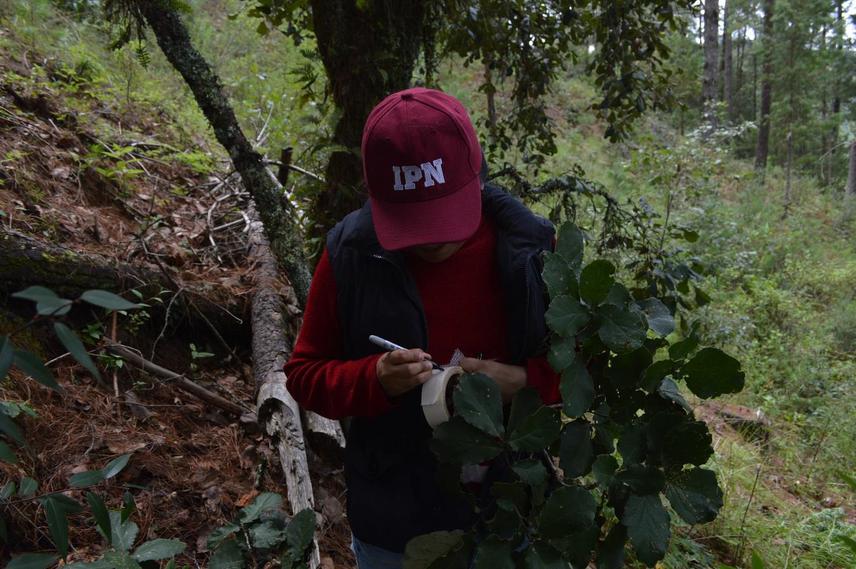Guadalupe Pacheco Aquino
The project will evaluate tree species composition in temperate forests in Oaxaca, Mexico, where bark beetle pests are causing high mortality in pine trees. The main goal is to test the hypothesis that remnant Quercus trees will become to be the most important canopy components and support the forest’s capacity to provide environmental services, Moreover, we propose that tree biodiversity may improve the ecological resilience of forests, which are increasingly being impacted by biotic threats associated with climate change; with the above we will be contributing to the conservation of the most diverse temperate forests in Oaxaca.

Collecting oaks in the study site.
The problem of forest pests of the bark beetle (BB) has generated concern among the forest communities of Oaxaca, since forest pests impose economic, ecological and social costs on the communities. Given this, we have observed how the areas that present only species of the genus Pinus can be devastated almost completely after BB attacks. However, when there is the presence of other species, the effect of pests can be mitigated. The Quercus genus is a natural part of the temperate forests of Oaxaca and could help increase the resilience of forests affected by pests. However, in recent years, there has been a decline in the Quercus genus due to its undervaluation in the wood industry, so there is no integral management of this genre. Until now, the emphasis on BB forest pests among the Oaxaca's forestry sector has been as a technical problem, support has been given to forest sanitation and reforestation with Pinus. However, the problem must be analyzed with a more comprehensive approach and considering the ecological role of bark beetles. In contrast to other forest countries, in Mexico there are relatively few ecological studies of stands impacted by BB. Thus, there is a vacuum in the ecological knowledge for Mexican biodiverse temperate forests affected by BB and how diversity in the tree stratum can increase ecological resilience through integral management.
This work will demonstrate that in temperate forests affected by BB pests, the Quercus genus can be a factor of ecological resilience, allowing the maintenance of carbon reservoirs and tree diversity. By demonstrating this, the Quercus genus may have been re-evaluated as a buffer against the mortality effect of BB pest on Pinus.
With this project I can generate information that demonstrates the importance of diversifying tree species composition and suggest innovations in forest management to local communities with the purpose of promoting the conservation of temperate forests of Oaxaca. This research project can be the basis for future work for the inclusion of this genre in the integral management of forests, starting from the production of seedlings, reforestation, density management and sustainable use. Finally, this project will be implemented as participatory research, so that local capacities can be developed to promote the inclusion of other genera in forest management and thus increase resilience to forest pests and achieve the conservation of temperate forests.